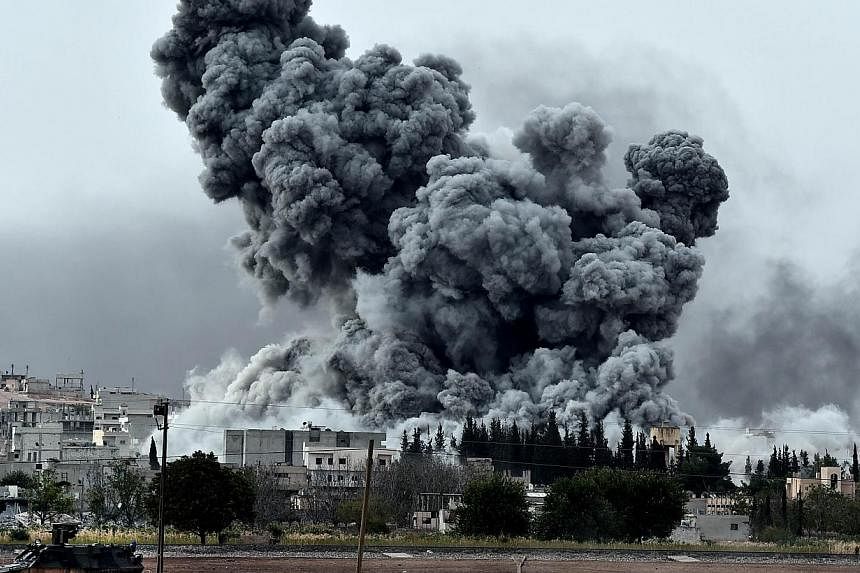MURSITPINAR, Turkey (AFP) - Islamic State in Iraq and Syria (ISIS) militants met dogged Kurdish resistance in the high-profile Syrian battleground town of Kobane on Sunday but they put Iraqi forces under heavy pressure, prompting the first US-led relief drops.
A roadside bomb killed the police chief of the Iraqi province of Anbar, between Baghdad and the Syrian border, where Pentagon officials have voiced concern about the vulnerability of government troops to a renewed offensive by the militants.
And further north, around the key oil refinery town of Baiji, the Iraqi army and its Sunni Arab tribal allies came under fresh attack by the ISIS group, prompting a maiden resupply operation by US-led coalition aircraft.
In Kobane, where ISIS is battling Kurdish fighters under the gaze of the international media massed just across the border with Turkey, the militants were taking heavy losses, the Syrian Observatory for Human Rights said.
On Saturday alone, the militants lost at least 36 fighters in the battle with Kurdish militiamen for the town, said the Britain-based monitoring group, which has a wide network of sources inside Syria.
IS has earned worldwide infamy for a spate of atrocities - many of them videotaped and paraded on the Internet - since it seized swathes of Iraq and Syria in lightning offensives earlier this year.
But it has also gained prestige among Islamist extremists around the world that has helped it recruit thousands of foreign fighters but which is now on the line in Kobane.
"It's a decisive battle for them," Observatory director Rami Abdel Rahman told AFP.
"If they don't pull it off, it will damage their image among militants around the world." Abdel Rahman said ISIS was pouring in reinforcements from other areas it controls in Syria, after its Friday capture of the Kurdish command headquarters in Kobane failed to deliver a decisive blow.
"They are sending fighters without much combat experience," he said.
"They are attacking on multiple fronts but they keep being repulsed, then countering and being pushed back again." The United Nations warned on Friday that hundreds of mainly elderly civilians remain in the town centre and thousands more on the outskirts who all risk massacre if the militants cut the sole escape route to the Turkish border.
Washington and its Arab allies have stepped up air strikes against IS targets around Kobane in recent days but Pentagon officials have said there is a limit to what they can do without forces on the ground they can work with.
The Kurdish fighters in Kobane - who have links with the outlawed Kurdistan Workers Party (PKK) over the border in Turkey, which is on Washington's terror blacklist - say they have had no coordination with US commanders.
State Department deputy spokeswoman Marie Harf said Washington was deeply concerned about the humanitarian risks of Kobane's fall but said it would keep to its overall strategy against IS, which prioritises the campaign in neighbouring Iraq.
"We know there's the threat of serious casualties - that's why we're taking strikes in the Kobane area against (ISIS) targets," Harf told AFP.
"What (ISIS) is doing in Kobane shows just how brutal these terrorists are. But the fight against (ISIS) is a much larger strategic effort than in any one town." That strategy has seen Washington and its coalition partners carry out hundreds of air strikes in Iraq in support of its allies on the ground - Kurdish forces in the north and embattled federal government troops further south.
Pro-government forces have come under particularly heavy pressure around the key oil refinery at Baiji, south of the Iraq's second city of Mosul, which the militants seized in June.
With the surrounding territory all in ISIS hands, the coalition airdropped ammunition, food and water to its besieged defenders on Friday and Saturday in the first such resupply operation to Iraqi forces, the Pentagon said.
US defence officials have expressed mounting concern about the tenuous position of Iraqi government troops in the face of the Sunni extremists of IS, particularly in the Sunni Arab heartland north and west of Baghdad.
Underlining that fragility, a roadside bomb killed Anbar province police chief Major General Ahmed Saddag on Sunday morning, police and provincial officials said.
He had been en route to a battleground town near the provincial capital Ramadi, one of few remaining areas in Anbar still in government hands.
With federal troops on the back foot, Washington and its allies have relied heavily on Iraqi Kurdish forces to make headway in the fightback against the militants.
But they too have come under pressure.
Three suicide car bomb attacks against offices in a Kurdish-controlled town north of Baghdad killed at least 25 people on Sunday, officials said.
Mayor Wahab Ahmed, who was himself wounded in the attack, said most of the dead in Qara Tapah were Kurdish peshmerga veterans who had volunteered to return to active duty to fight ISIS.

